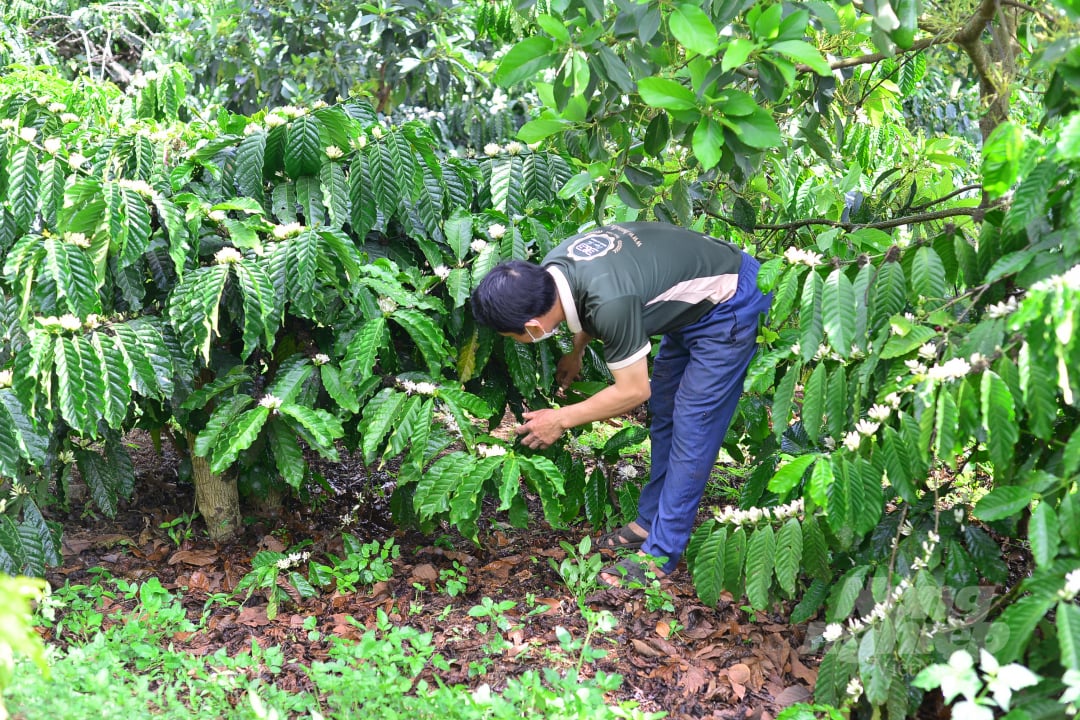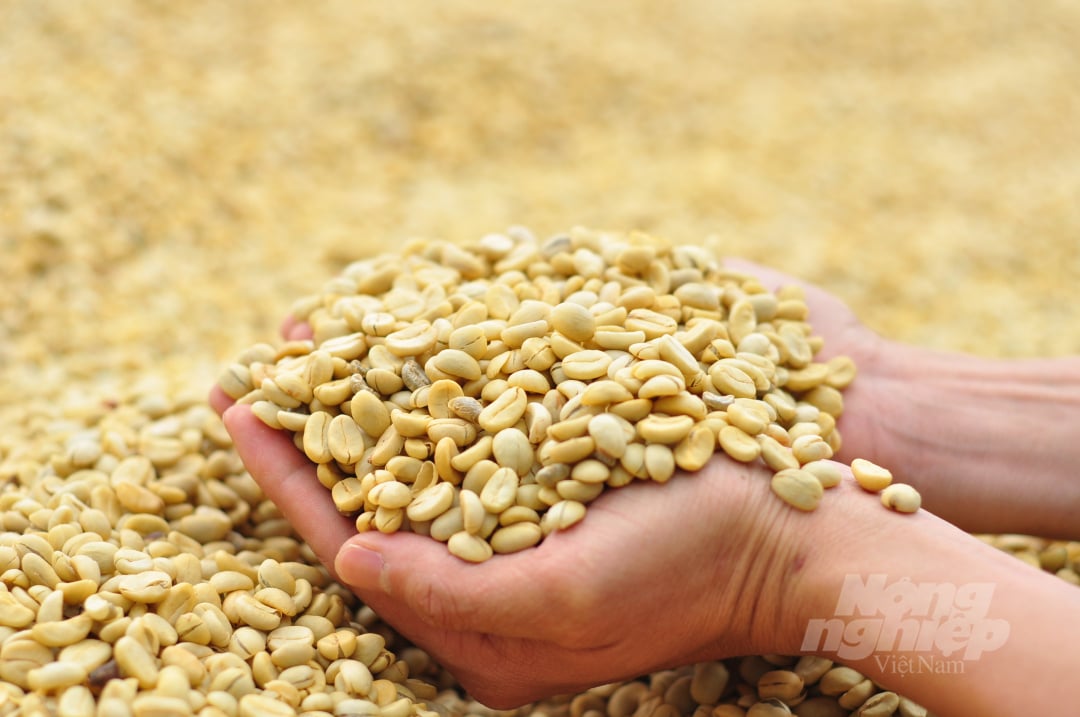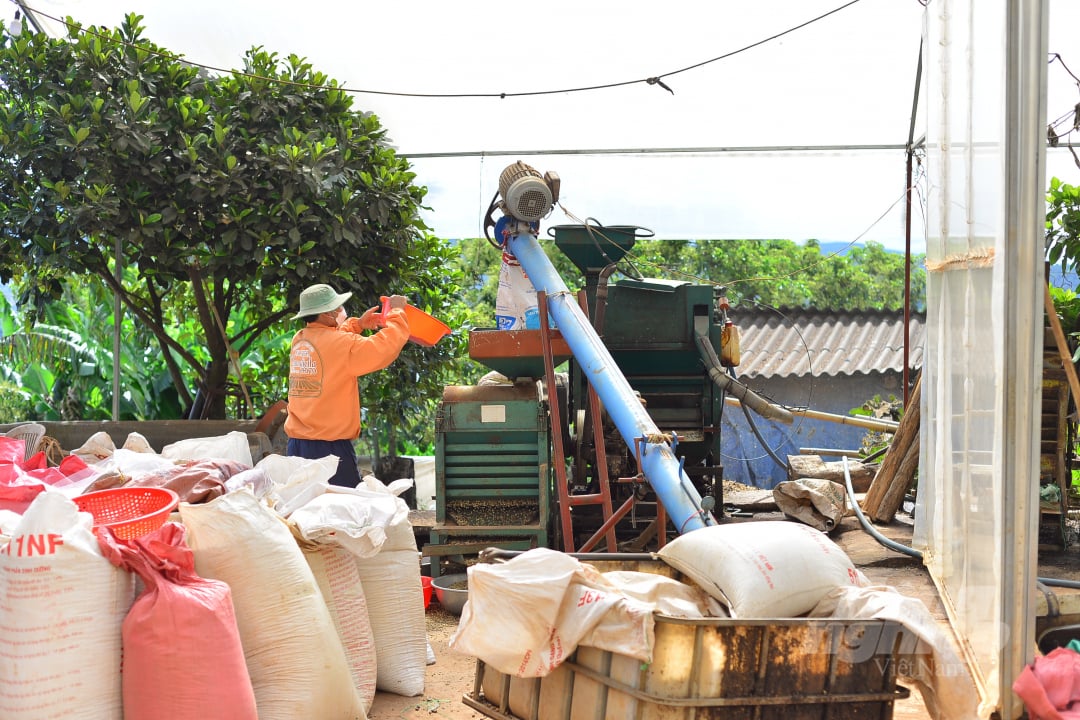November 22, 2025 | 10:18 GMT +7
November 22, 2025 | 10:18 GMT +7
Hotline: 0913.378.918
November 22, 2025 | 10:18 GMT +7
Hotline: 0913.378.918
In 2017, Mr. Tran Van Xuat, a local in Nam Ban Town, Lam Ha District, Lam Dong Province called for the establishment of the Chi Lang - Dong Anh coffee production group. By 2019, with the support of the VnSAT project, the group developed stably and developed into Nam Ban Agricultural Cooperative (NBAC).
The Cooperative now has about 24 members farming on an area of about 50ha of coffee integrated with avocado. The entire area is being developed under a high-quality model and has obtained UTZ certification.
According to Mr. Xuat who is now Director of the NBAC, in the past, his family and other coffee households in the area followed traditional production methods and sold products to traders or purchasing outlets in the region.

Currently, the coffee gardens of Nam Ban Agricultural Cooperative’s members have achieved UTZ certification. Photo: Minh Hau.
"In the past, as we kept using chemical fertilizers and pesticides, the soil in the garden began to arid, and the plants also became poor quality in growth. It was until we get technical training supports of VnSAT's project, we know and switch to clean coffee production," Xuat revealed.
According to Mr. Xuat, currently, NBAC members are applying clean production processes to limit the use of chemical fertilizers and toxic pesticides to protect human health and the environment. The grass in coffee gardens is maintained following an organic agricultural model to create the microflora that can contribute to improving the soil’s quality, moisture, and humus and boost plants’ growth.
To increase production value, the NBAC members are also intercropping different high-yield avocado varieties such as the 034, Hass, and Pinkerton. These plants both create canopy and shade for coffee and help growers raise their income. "Particularly for avocado, each crop can give a yield of about 100kg of fruit per plant. For some years, a household even can annually harvest 15 tons of fruit/crop," said Mr. Xuat.

With support from the VnSAT Project, each year, Nam Ban Agricultural Cooperative can produce about 100 tons of high-standard green coffee and 150 tons of common coffee beans. Photo: Minh Hau.
For coffee, after harvesting 100% ripe fruit, farmers move on to the processing stages. The fruits will be selected before putting into a soaking tank, washed, and then put on a scrubbing machine. The coffee beans which are selected for producing honey coffee will be put into a greenhouse to dry…
Mr. Xuat also said with the support of the VnSAT Project, each year, the NBAC can produce about 100 tons of high-standard green coffee and 150 tons of common products. Currently, an enterprise has contracted with the cooperative to purchase about 100 tons/year of high-standard coffee products.
The Cooperative has also signed contracts with its members to purchase fresh coffee at a price higher than the market price.

Nam Ban Agricultural Cooperative has invested in a machinery system to ensure preliminary processing as well as the whole production. Photo: Minh Hau.
To improve production capacity and increase the value of agricultural products, the NBAC in the recent time has invested in building a system of warehouses and greenhouses for drying coffee.
The cooperative also invests in many machines for effective coffee preliminary processing and production. "Currently, along with organizing a linkage in clean coffee production, we are also promoting market expansion to introduce our clean coffee products to foreign countries," said the NBAC director.
Mr. Nguyen Van Chau, Deputy Director of Lam Dong Department of Agriculture and Rural Development, said the Lam Dong VnSAT project has supported 44 farmer organizations in the province's key coffee production areas under the farmer group/cooperative model consisting of about 14,000 farmer households who have been guided to follow a sustainable coffee production process. The project has supported coffee cooperatives and cooperative groups to improve their capacity in processes of operating warehouse systems, drying, and pre-processing. This has also helped them complete their coffee production at the same time improve the product quality.
Over the past time, VnSAT has become a bridge connecting coffee cooperatives with input suppliers, processing and roasting enterprises to form a chain from production to consumption which aims to improve the value chain for coffee products. Through vocational training activities, seminars and communication, models of technical support and investments in infrastructure for farmer organizations have been recognized, widely known and replicated among farmers in districts and communes.
Translated by Linh Nguyen

(VAN) Results from the Sustainable Durian Model Project in Dak Lak have confirmed the critical role of Yara Viet Nam in transferring advanced nutritional solutions to farmers.

(VAN) In Tuyen Quang province, livestock farmers have introduced effective models and innovative practices that significantly strengthen African Swine Fever prevention and control efforts.

(VAN) This is the study conducted by IRRI and Can Tho University on the rice straw value chain in Mekong Delta showing an economic potential of more than 6.6 trillion VND/year.

(VAN) By participating in cooperative economics, many farmers in Tay Ninh have overcome hardship, mastered clean dragon fruit cultivation techniques.

(VAN) The crossbreeding program in the former Binh Dinh province (now part of Gia Lai) has shown signs of decline, and urgent measures are needed to revive it and sustain past achievements.

(VAN) The agricultural sector agreed on a roadmap to pilot the MRV protocol and expand low-emission rice production from the 2025-2026 winter-spring crop.

(VAN) Agricultural extension officers in Quang Ninh do more than transmit knowledge; they have become a steadfast support system for farmers on the path to sustainable agricultural development.